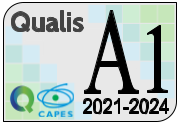Como devemos viver juntos? Escolhendo a luta por valores inclusivos
DOI:
https://doi.org/10.21723/riaee.v13.nesp2.set2018.11650Palavras-chave:
Inclusão, Exclusão, Valores, Valores de Alfabetização, Neoliberalismo, Meio Ambiente, Mudanças ClimáticasResumo
Este artigo discute como um profundo comprometimento com os conceitos de inclusão e exclusão pode ajudar a transformar nosso pensamento e prática em questões de grande importância para a sociedade e a educação. A tarefa de desenvolver o pensamento e a prática inclusivos, compensando o pensamento e a ação excludentes na educação e na sociedade nunca foi tão importante. Abordagens econômicas globais contribuem para as grandes desigualdades de renda, saúde, segurança, respeito, qualidade de vida e sustentabilidade dos ambientes que, por sua vez, alimentam a migração em massa. Manter um mundo natural capaz de promover o florescimento humano tornou-se fundamental para entender e excluir as pressões para nós no futuro e para milhões de pessoas no presente. Continuamos arruinando a casa que compartilhamos. No entanto, a falha em lidar rapidamente com a destruição ambiental causada pelos seres humanos, incluindo o aquecimento global, deixou um tempo limitado para ação. Como educadores, temos a responsabilidade de nos distanciar das concepções limitadas dos papéis que herdamos e de promover uma educação que seja parte da solução para os problemas urgentes do nosso tempo.Downloads
Referências
BOOTH, T. and Ainscow, M. The Index for Inclusion, A guide to school development led by inclusive values, Cambridge, Index for Inclusion Network, 2016. (obtainable through info@indexforinclusion.org).
BECKER, E. The Denial of Death. New York: Simon & Schuster, 1973.
DEPARTMENT FOR EDUCATION. The prevent strategy; departmental advice for schools and childcare providers, London, Her Majesty’s Government, 2015.
FARRER, F. A quiet revolution, encouraging positive values in our children.
London. Ebury Press, 2000.
GUATTARI, F. The three ecologies, London, Bloomsbury, 2000.
HAWKES, N. How to inspire and develop positive values in your classroom, Cambridge, LDA, 2003.
HIGHAM, R.; BOOTH, T. Reinterpreting the Authority of Heads: Making Space For Values-Led School Improvement with the Index for Inclusion in Educational Management, Administration and Leadership, first published October 2016.
Holmes, T.; Blackmore, E.; Hawkins, R.; Wakeford, T. The common cause handbook, Machynlleth, Public Interest Research Centre, 2011.
KLEIN, N. This changes everything, capitalism versus the climate, New York, Simon Schuster, 2014.
LANGDON, A. Cuts to legal aid mean the most vulnerable in society are at risk, London, The Times, 2017.
MARSHALL, G. Don’t even think about it; why our brains are wired to ignore climate change, London, Bloomsbury, 2014.
MINISTRY OF JUSTICE. Home Office & the Office for National Statistics. An Overview of Sexual Offending in England and Wales, Statistics Bulletin, January 2013, London, Her Majesty’s Government, 2013.
MORIN, E. Seven Complex Lessons in Education for the Future, Paris, UNESCO, 2001.
NODDINGS, N. The challenge to care in schools: an alternative approach to education, New York, Teachers College Press, 2005.
RAWORTH, K. Doughnut economics: seven ways to think like a 21st century economist, Hartford, Chelsea Green Publishing, 2016.
RAWORTH, K. 7 ways to think like a 21st Century economist, 2017. Available in: https://www.triplepundit.com/2017/04/7-ways-think-like-21st-century-economist/.
WASHINGTON, H.; COOK, C. Climate Change Denial: Heads in the Sand, London, Earthscan, 2011.
WOOLF INSTITUTE. Living with difference community, diversity and the common good, Report of the commission on religion and belief in British public life, Cambridge, Woolf Institute, 2015.
Downloads
Publicado
Como Citar
Edição
Seção
Licença
Manuscritos aceitos e publicados são de propriedade dos autores com gestão da Ibero-American Journal of Studies in Education. É proibida a submissão total ou parcial do manuscrito a qualquer outro periódico. A responsabilidade pelo conteúdo dos artigos é exclusiva dos autores. A tradução para outro idioma é proibida sem a permissão por escrito do Editor ouvido pelo Comitê Editorial Científico.








